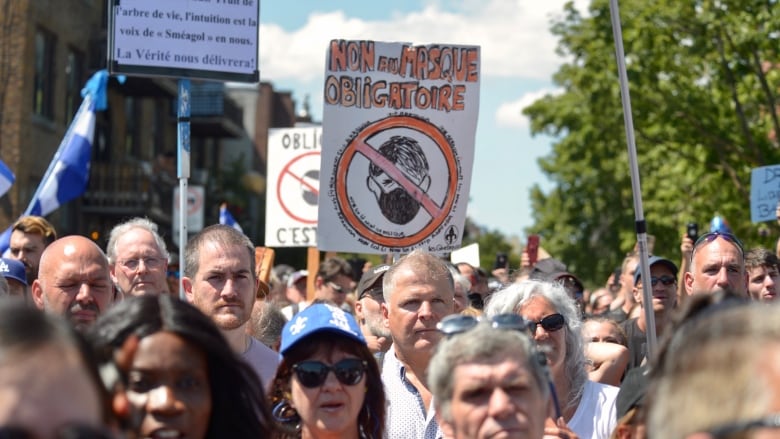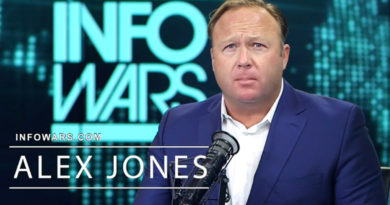Quebec’s political class takes on radio station that gives voice to the anti-mask movement
On an overcast Sunday in the middle of May, a group of about 60 people from the Montreal area jumped into their cars and drove to the National Assembly in Quebec City to protest, among other things, World Health Organization “tyranny”.
They were brought together through an obscure Facebook group, and a straight line can be drawn between that caravan and a decision this week by Quebec City Mayor Régis Labeaume to yank his municipal administration’s ads from CHOI Radio X, a talk-radio outlet known for its abiding love of controversy.
Around the time that May protest was being organized, an accountant and fringe politician named Stéphane Blais established a group that has since staged multiple rallies against the restrictions aimed at preventing the spread of COVID-19.
The group is part of a curious alliance of libertarians, anti-government QAnon-types, evangelicals, minor internet celebrities and far-right activists.
Roxane Martel-Perron, an expert on right-wing extremism in Quebec, has been monitoring the spread of conspiracy theories during the pandemic, and said they are steadily infiltrating the mainstream.
“The social cost right now of being either anti-mask or adhering to conspiracy theories is lower now than it was at the beginning of the pandemic,” said Martel-Perron, the Director of Education and Skills Development at the Center for the Prevention of Radicalization Leading to Violence.
Labeaume and others are evidently trying to increase that cost.
Montreal Mayor Valérie Plante, for instance, had this message for a group that’s planning a protest in her city next weekend: “Go find a potato field”.
Labeaume admitted the conspiracists’ collective effort to muddy the waters on coronavirus mitigation measures like masks “is working,” and on Tuesday called those who obfuscate around the science a threat to public health.
“We’ve noticed that message, of trivializing health measures, is starting to percolate in the population, in the sense that the message is these measures aren’t necessary … we believed and continue to believe this is a danger to public health,” he said.
Quebec City decided to target one of the preferred means of spreading the anti-mask and confinement-skeptic message. It pulled its municipal ads from CHOI, a controversial talk-radio station.
CHOI has regularly welcomed to its airwaves conspiracists and Internet provocateurs like Blais, former union leader Ken Pereira, YouTube maven Alexis Cossette-Trudel, and a host of others.
Pulling a $9,000 ad campaign presents no significant danger to the station’s finances, but it did carry a symbolic punch.
After Quebec City’s announcement Monday, more than a dozen advertisers, including a major insurance company, a Crown corporation, several car dealers and a well-known bank quickly followed suit.

It’s been an eventful few days for CHOI and its parent company, RNC Média.
Last week the station refused to air an ad produced for the provincial government – which featured the voices of two former Radio X hosts and lampooned the station’s style while taking dead aim at the “charlatans” who peddle misinformation.
RNC vice-president Phillipe Lefebvre released an open letter denouncing the ad for unfairly maligning the company’s audience and making “a direct link between CHOI Radio X and conspiracists, which we cannot accept under any circumstance.”
The company has since stressed its employees, many of whom have lent their voices to public health spots, do not traffic in conspiracy talk, even if their guests often do.
The missive also made a point of repeating the station’s commitment to unfettered free speech.
Pushing the limits
That commitment to free speech has been a frequent defence when one of the company’s radio personalities crosses the line of propriety. They have done so routinely, whether it’s in relation to Islam, feminism, Indigenous people, and myriad other topics.
Colette Brin, a professor at Université Laval and director of the school’s Centre d’études sur les médias, describes Radio X and its hosts as opportunists, not necessarily true believers.
“(CHOI’s) brand is to push the limit of what is acceptable, or even legal in some cases… their genius, if you want to call it that, is to mix conspiracy in with legitimate criticism,” she said.
While Brin said it’s generally a poor idea for elected officials to lead advertising boycotts and try to influence a media company’s content, in this case “it can be justified.”
Research from the CEM and elsewhere concludes it is hard to know what impact marginal movements may have on public opinion, but Labeaume contends that CHOI “is a private business … with a great deal of influence.”
Politicians of every stripe — including Labeaume and much of the current Coalition Avenir Québec cabinet — have sought to leverage that influence at election time.
That makes it all the more noteworthy that the same politicians are now scolding them.
The Radio X audience has declined steadily over the past three years, according to the ratings company Numeris, but the outlet maintains a devoted following.
Some of those loyal listeners decided to express their displeasure on Labeaume’s personal Facebook page. The mayor reported the most threatening of the 3,500 messages he received to police. The backlash against Labeaume illustrates a key problem in confronting the conspiracy apparatus.
“This is free publicity,” said Brin, “it’s a great way to attract attention, I’m sure they don’t mind.”
*** This article has been archived for your research. The original version from CBC.ca can be found here ***


